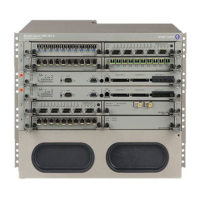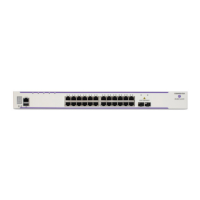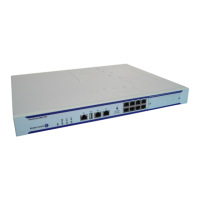Virtual Private LAN Services
7750 SR OS Services Guide Page 511
offered-load equaled 7000 octets and the frame based PIR equaled 8250 octets, the frame based
within-pir offered load would equal 7000 octets.
Port scheduler operation using frame transformed rates — The port scheduler uses the frame based
rates to calculate the maximum rates that each queue may receive during the within-cir and above-cir
bandwidth allocation passes. During the within-cir pass, a queue may receive up to its frame based
within-cir offered-load. The maximum it may receive during the above-cir pass is the difference
between the frame based within-pir offered load and the amount of actual bandwidth allocated during
the within-cir pass.
SAP and subscriber SLA-profile average frame overhead override — The average frame overhead
parameter on a sap-egress may be overridden at an individual egress queue basis. On each SAP and
within the sla-profile policy used by subscribers an avg-frame-overhead command may be defined
under the queue-override context for each queue. When overridden, the queue instance will use its
local value for the average frame overhead instead of the sap-egress defined overhead.
The no form of this command restores the average frame overhead parameter for the queue to the
default value of 0 percent. When set to 0, the system uses the packet based queue statistics for calcu-
lating port scheduler priority bandwidth allocation. If the no avg-frame-overhead command is exe-
cuted in a queue-override queue id context, the avg-frame-overhead setting for the queue within the
sap-egress QoS policy takes effect.
Default 0
Parameters percent — This parameter sets the average amount of packet-to-frame encapsulation overhead
expected for the queue. This value is not used by the system for egress Ethernet queues.
Values 0 — 100
cbs
Syntax cbs size-in-kbytes
no cbs
Context config>service>vpls>sap>egress>queue-override>queue
config>service>vpls>sap>ingress>queue-override>queue
Description This command can be used to override specific attributes of the specified queue’s CBS parameters.
It is permissible, and possibly desirable, to oversubscribe the total CBS reserved buffers for a given
access port egress buffer pool. Oversubscription may be desirable due to the potential large number of
service queues and the economy of statistical multiplexing the individual queue’s CBS setting into the
defined reserved total.
When oversubscribing the reserved total, it is possible for a queue depth to be lower than its CBS set-
ting and still not receive a buffer from the buffer pool for an ingress frame. As more queues are using
their CBS buffers and the total in use exceeds the defined reserved total, essentially the buffers are
being removed from the shared portion of the pool without the shared in use average and total counts
being decremented. This can affect the operation of the high and low priority RED slopes on the pool,
causing them to miscalculate when to start randomly drop packets.
If the CBS value is larger than the MBS value, an error will occur, preventing the CBS change.
The no form of this command returns the CBS size to the default value.
Default no cbs
